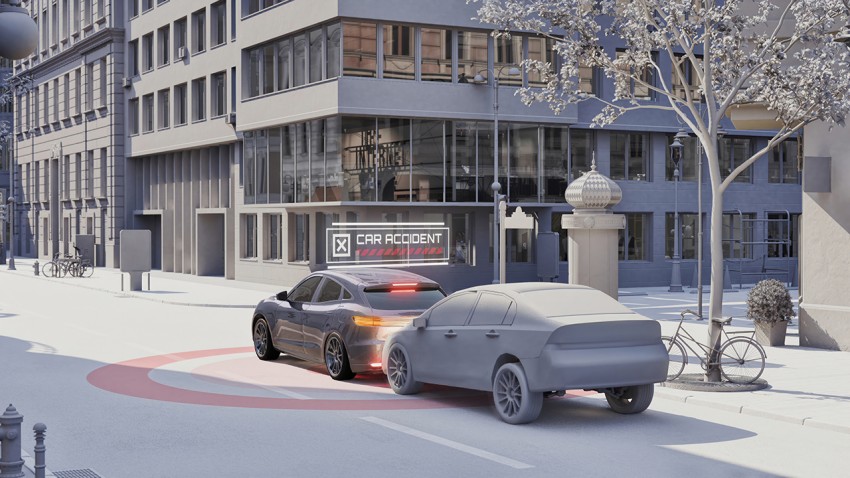Education
Researchers Call for Better Sharing of Autonomous Vehicle Crash Data

Autonomous vehicles (AVs) have been in testing as taxis for decades in cities like San Francisco and Pittsburgh. Despite the potential for enhanced safety and efficiency, AV companies are often reluctant to share crucial crash and safety data. Researchers from Cornell University have highlighted the barriers that prevent data sharing and proposed strategies to promote transparency for the greater good.
The research team, led by doctoral candidate Hauke Sandhaus, presented their findings on October 16, 2023, at the ACM on Human-Computer Interaction. Their paper, titled “My Precious Crash Data,” outlines the challenges and opportunities surrounding data sharing within the AV industry. Sandhaus and his colleagues argue that while companies may view safety data as an intellectual asset, it should also be regarded as a public good that can benefit society.
Through interviews with 12 employees from various AV companies, the researchers uncovered a diverse range of data management practices. Sandhaus noted, “Everyone really has some niche, homegrown data set, and there’s really not a lot of shared knowledge between these companies.” This lack of standardization creates significant challenges in improving safety protocols across the industry.
Two primary barriers to data sharing emerged from the interviews. First, the proprietary nature of crash and safety data complicates internal sharing even within companies. As the researchers wrote, “Data sharing, even within a company, is political and fraught.” Second, the prevailing view among interviewees is that safety knowledge provides a competitive edge, leading them to prioritize proprietary interests over public safety.
Regulatory frameworks in the United States and Europe further complicate the situation. Current regulations require minimal information, such as the month of the crash and whether injuries occurred, failing to capture critical contextual factors that often contribute to accidents. These factors can include pedestrian behavior, traffic violations, or adverse weather conditions.
To encourage a culture of data sharing, the Cornell researchers propose several strategies. One suggestion is to separate proprietary data from safety knowledge. For instance, companies could share accident reports without disclosing raw video footage that might reveal technical vulnerabilities. Additionally, the researchers suggest implementing standardized “exam questions” that AVs must pass to operate on public roads.
Such questions could involve complex scenarios, like managing interactions between pedestrians and vehicles, which would help assess the safety algorithms of different AV systems. This approach not only promotes safety but could also foster healthy competition among manufacturers.
The researchers also emphasize the potential role of academic institutions as intermediaries in data sharing. Collaborating with independent research organizations could facilitate sharing while safeguarding proprietary information. Qian Yang, one of the co-authors, noted that “there are arrangements and collaboration patterns for higher education to contribute without necessarily making the entire data set public.”
Furthermore, the researchers advocate for improved government regulations that standardize AV safety assessments. For example, a federal agency could establish a virtual testing environment that simulates complex urban scenarios, compelling AV companies to contribute test cases to ensure their vehicles meet safety benchmarks.
Yang remarked, “Proposing policy changes always feels a little bit distant, but I do think there are near-future policy solutions in this space.” The research was funded by the National Science Foundation and Schmidt Futures, highlighting the significance of collaborative efforts in addressing these industry challenges.
Ultimately, the findings from Cornell University underscore the need for a shift in how AV companies perceive and manage safety data. By fostering a more open environment for sharing information, the industry can enhance the safety of autonomous vehicles and contribute to public welfare.
-

 Technology5 months ago
Technology5 months agoDiscover the Top 10 Calorie Counting Apps of 2025
-

 Health2 months ago
Health2 months agoBella Hadid Shares Health Update After Treatment for Lyme Disease
-

 Health3 months ago
Health3 months agoErin Bates Shares Recovery Update Following Sepsis Complications
-

 Technology4 months ago
Technology4 months agoDiscover How to Reverse Image Search Using ChatGPT Effortlessly
-

 Technology1 month ago
Technology1 month agoDiscover 2025’s Top GPUs for Exceptional 4K Gaming Performance
-

 Technology2 months ago
Technology2 months agoElectric Moto Influencer Surronster Arrested in Tijuana
-

 Technology5 months ago
Technology5 months agoMeta Initiates $60B AI Data Center Expansion, Starting in Ohio
-

 Technology5 months ago
Technology5 months agoRecovering a Suspended TikTok Account: A Step-by-Step Guide
-

 Health4 months ago
Health4 months agoTested: Rab Firewall Mountain Jacket Survives Harsh Conditions
-

 Lifestyle5 months ago
Lifestyle5 months agoBelton Family Reunites After Daughter Survives Hill Country Floods
-

 Technology4 months ago
Technology4 months agoHarmonic Launches AI Chatbot App to Transform Mathematical Reasoning
-

 Technology3 months ago
Technology3 months agoUncovering the Top Five Most Challenging Motorcycles to Ride





















